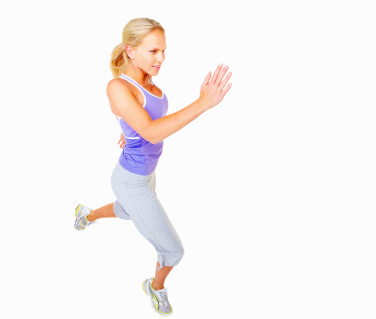Strength Training for Runners - All You Need to Know

Well, as I got a little older and reached middle age, I started getting some injuries. Whenever I'd get serious about my running and wanted to ramp up my mileage I'd start getting some niggles. My ITB started playing up... I'd get some problems with my Achilles... sometimes my lower back would more or less give up and I'd be walking and feeling like a 90-year-old for a week...
Realising that something needed to change, both for my running performance, but also for a healthy old age, I started working with a personal trainer. And I have never looked back! Because you know what....
... That ITB is no longer bothering me...
... My Achilles has been quiet and happy for years now...
... And my lower back is no longer giving me any issues...
And I have strength training to thank for it!

... Why strength training is so beneficial for runners...
... How you can implement strength training into your running program...
... How the science around strength training has progressed...
... What I do when it comes to strength training...
... Ideas of strength training exercises you can start doing to improve your running...
Hope that excites you!
Strength Training for Runners - Why Do It?

Let's get into these into a little bit more detail:
Injury Prevention
In line with my personal experiences, one of the most significant benefits of strength training for runners is injury prevention. Running is a high-impact activity that puts a lot of stress on your body, especially the lower body. When you incorporate strength training exercises into your routine, you can help build stronger muscles and joints, which can help reduce the risk of injury.
Especially when you want to push your performance and increase your mileage, you are really testing your body and you'll want to make it as strong as possible to endure the work you are asking it to do.
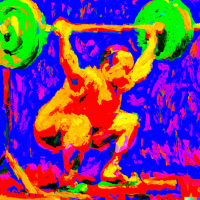
Another benefit of strength training for runners is improved running form. By strengthening the muscles used during running, you can help improve your posture, balance, and alignment, which can help you run more efficiently and with better form.
For example, exercises that target your core muscles, such as planks and Russian twists, can help improve posture and alignment, which can lead to a more efficient running stride and can help keep you running strong when you get tired.
Increased Power and Speed
Strength training can also help improve your running performance by increasing power and speed. By building stronger muscles, you can generate more force with each stride, which can help you run faster and more efficiently.
Just consider this for a second. Most of us, when running, take about 160-180 steps per minute. Suppose you run a 3 hour marathon. Which is fast. In those three hours you will take about 30,000 steps. Imagine if all of those steps were just 1% stronger or more efficient. Small improvements make a massive difference!
Different types of exercises can help improve power and speed. Exercises that focus on explosive power, such as jump squats and box jumps, can help improve leg strength and power, which can translate to increased speed and endurance during running. Similarly, exercises that target the glutes and hamstrings, such as deadlifts and lunges, can help improve stride length and power.

In addition to all the benefits mentioned before, strength training can also help enhance endurance for runners. By building stronger muscles, you can maintain proper form and stride longer, which can help you run for longer periods of time without experiencing fatigue or discomfort.
Improved Mental Toughness
Finally, strength training can also help improve your mental toughness. By pushing through challenging exercises and overcoming physical barriers, you can build mental resilience, build confidence and develop a stronger mindset, which can translate to improved performance during running.
Incorporating Strength Training Into Your Running Routine
Now that we’ve explored some of the key benefits of strength training for runners, let’s take a look at how to incorporate strength training into your running routine. I'll cover:

New to strength training? Then it's a good idea to start with bodyweight exercises. Bodyweight exercises are so good! They offer a very low risk way to get used to strength training and can offer a lot in terms of benefits. You can definitely build up your strength from just bodyweight work, such as squats, lunges, push-ups, and planks.
Bodyweight exercises can help you build a foundation of strength and conditioning, which can prepare you for more advanced exercises that require equipment or weights.
Additionally, once you are a little bit used to bodyweight exercises, you can expand your repertoire by getting some resistance bands or a few dumbbells or kettlebells.
Eventually though you may want to look at the next step: setting foot into the gym and/or working with a personal trainer.
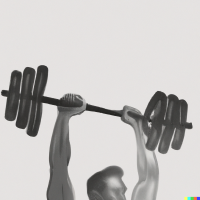
I was always a bit scared of gyms. It can be quite an intimidating environment. All these machines that you don't know how to use, big gym bros that push massive amounts of weights around, etc, etc.
Most of this is a simple fear of the unknown. Anticipation is generally much worse than participation!
But, you can take a lot of this initial anxiety away, by working with a personal trainer. A personal trainer can help you find your way around the gym. They can work out what exercises you need to achieve your goals. The people I have worked with have all been really good in explaining machines, explaining proper technique when doing free weights and pushing me to the next level.
I know that a personal trainer can be a big investment. If you know you can only work with a personal trainer for a short amount of time, be upfront with them. Tell them, you'd like to do 3-5 lessons with them and ask them to explain a number of the key machines and techniques. They will generally be very open to this. And I can guarantee you, that after working with them, you will be much more knowledgeable around the gym machines and will get more comfortable visiting the gym more often.
Focus on Compound Exercises
Compound exercises are exercises that work multiple muscle groups at the same time. Examples of compound exercises include squats, deadlifts, and pull-ups.

Incorporate Heavy Weights with Low Reps
While bodyweight exercises and lighter weights can be helpful for building a foundation of strength, as you progress I'd like you to challenge yourself with heavier weights.
Back in the old days the conventional running strength training consisted of low weights with high reps (e.g. 15-30 reps). The idea was that strength training should provide a cardiovascular benefit.
But you know what we have come to realise? The best way to build our cardiovascular system is ... running. You don't need more cardio in the gym. You get enough of it when running. So, use the gym for truly getting stronger. You do this best through incorporating heavier weights with lower reps (i.e., 3-10 reps per set). We don't need to become powerlifters. And I would not expect you to test your 1 rep maximum in the gym. But, the science is very clear on this now, strength training with heavier weights and lower rep counts is more beneficial than what we used to do 15-20 years ago.

Don't Neglect Core Strength
A strong core provides many benefits as highlighted before. Your core is central to your body's movements. It's called core for a reason! It's at the center of everything we do. A strong core improves your posture, helps prevent injuries and reduces back pain to mention just a few of the benefits. I'll get into what I do in the gym in more detail in the next section, but I think it is beneficial to always do a little bit of core work at the end of my gym routine. I almost always finish with core, regardless of whether my gym session that day was more focused on legs or more on arms (or a combination).
My Strength Training Routine
Let me start by saying that my strength training evolves as I learn more and my needs change. My routine from three or four years ago is different from what it is now. I go to the gym 2 or 3 times per week. Each visit lasts 30-45 minutes. One of the sessions is with a Personal Trainer. I used to focus mostly on legs with my Personal Trainer, but I mix it up a little bit more now.
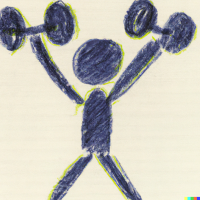
So, what types of exercises do I do? I do try to vary the exercises I do. But there are definitely some favourites that I do regularly. Let me break them up as follows:
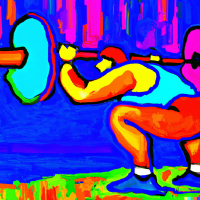
Strength training is no longer an optional extra for us runners. We NEED strength training. To help keep us running. To get us stronger. And to get us faster. I hope this page has helped provide you with that perspective and that you have an understanding of what type of strength training you can do. Just keep in mind that a little goes a long way. Two or three short sessions per week with a mix of lower body, upper body and core exercises will give you pretty much all the benefits you need!
Home > Running Training > Strength Training for Runners


